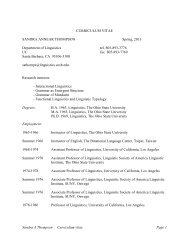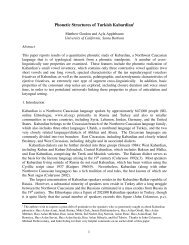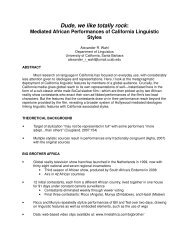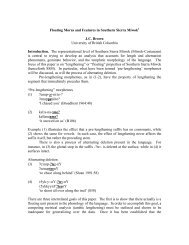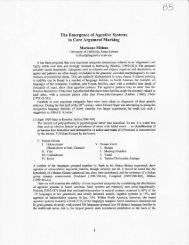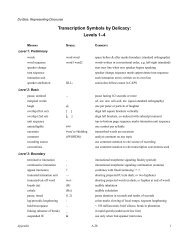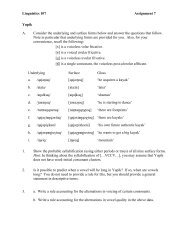Negotiating Hegemonic Masculinity: Imaginary ... - UCSB Linguistics
Negotiating Hegemonic Masculinity: Imaginary ... - UCSB Linguistics
Negotiating Hegemonic Masculinity: Imaginary ... - UCSB Linguistics
You also want an ePaper? Increase the reach of your titles
YUMPU automatically turns print PDFs into web optimized ePapers that Google loves.
prescriptive social norms which make up hegemonic masculinity is left unclear. It<br />
tends in Connell's writings to be correlated with what might be called macho<br />
masculinity and exemplified by fictional characters in films such as Rambo, Rocky<br />
and the Terminator. It is also unclear whether there is only one hegemonic strategy at<br />
any point in time or whether hegemonic strategies can vary across different parts of a<br />
social formation, creating conflicts or tensions for individual men between different<br />
hegemonic forms as they move across social practices.<br />
<strong>Hegemonic</strong> masculinity is presented in Connell's work as an aspirational goal rather<br />
than a lived reality for ordinary men. Indeed a key characteristic seems to be its<br />
'impossibility' or 'phantastic' nature (c.f. Frosh, 1994). No living man is ever man<br />
enough by this reckoning and this transcendent and unattainable quality gives<br />
hegemonic masculinity regulatory force. Connell argues that most men are complicit<br />
with hegemonic masculinity, even if they are unable to (or refrain from) strutting like<br />
Rambo, since they benefit from the dominant definition both as a source of fantasy<br />
gratification and, more practically, through the systematic subordination of women.<br />
As social psychologists, however, we wonder about the appropriateness of a<br />
definition of dominant masculinity which no man may actually ever embody. What<br />
does it say, for example, about the concept of hegemonic masculinity when some of<br />
the most institutionally powerful men in the UK, like Tony Blair and Gordon Brown<br />
(the current Prime Minister and Chancellor of Great Britain), could also be described<br />
as non-hegemonic in terms of personal style (c.f. also Donaldson, 1993)?<br />
There is, therefore, a lack of specification on how hegemonic masculinity might<br />
become effective in men's psyches. What happens psychologically? How are the<br />
norms conveyed, through what routes, and in what ways are they enacted by men in<br />
their daily lives? What are the norms? Are they the same in every social situation?<br />
Does everyone know what counts as hegemonic all the time? How is hegemony<br />
conveyed interactionally and practically in mundane life? How do men conform to an<br />
5




